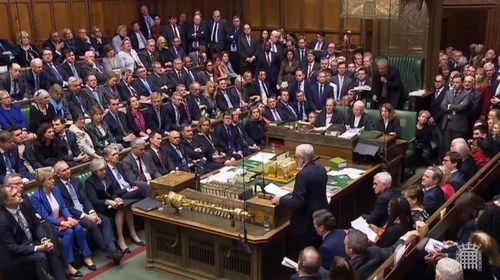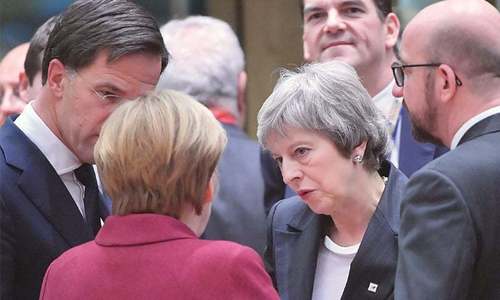Prime Minister Theresa May will ask the European Union to delay Brexit by at least three months after her plans for another vote on her twice-defeated divorce deal were thrown into crisis by a surprise intervention by the speaker of parliament.
Nearly three years after Britain voted to leave the EU, its departure is uncertain. Possible outcomes still range from a long postponement, leaving with May’s deal, a disruptive exit without a deal, or even another referendum.
Explore: What is Brexit all about?
Just 10 days before the March 29 exit date that May set two years ago by submitting a formal “Article 50” request to leave — and two days before a crucial EU summit — she was on Tuesday writing to European Council President Donald Tusk to ask for a delay, her spokesman said.
It was not immediately clear how long a delay she would seek. She had warned parliament that if it did not ratify her deal, she would ask to delay Brexit beyond June 30, a step that Brexit’s advocates fear would endanger the entire divorce.
Other EU member states were discussing two main options: a delay of two to three months, if May persuades them she can clinch a deal at home, or much longer if May accepts that radical reworking is needed.
The BBC’s political editor, Laura Kuenssberg, said May would ask for an extension until June 30 — which could give her another chance to get parliament to bless her deal — with the option of a delay of up to two years.
Brexit crisis
In a move that added to the sense of crisis in London, speaker John Bercow ruled on Monday that May’s Brexit deal had to be substantially different to be voted on again by parliament.
Brexit Secretary Steve Barclay said a vote this week on the deal was now less likely. But ministers were studying options, and he indicated the government still planned a third vote.
“This is a moment of crisis for our country,” he said.
The EU’s most powerful leader, German Chancellor Angela Merkel, said: “I will fight until the last minute of the time to March 29 for an orderly exit. We haven’t got a lot of time for that.”
Her foreign minister, Heiko Maas, said: “If more time is needed, it’s always better to do another round than a no-deal Brexit.”
If it left this way, Britain would quit the EU’s 500 million-strong single market and customs union overnight, falling back on World Trade Organisation rules that could mean many import and export tariffs. It would face the prospect of manufacturing and financial market disruption, sharp economic contraction and border delays..
But France was blunter, saying a no-deal exit was possible.
“Grant an extension — what for? Time is not a solution, it’s a method,” said EU Affairs Minister Nathalie Loiseau. “If there is an objective and a strategy, it has to come from London.”
However, senior EU figures, while exasperated by Britain’s Brexit dithering, have no appetite for pushing it out on schedule without a deal.
The 2016 referendum, which produced a 52-48 per cent vote to leave, exposed deep divisions and has fuelled soul-searching about everything from secession and immigration to capitalism and British identity.
Patience running out
The crisis has left allies and investors puzzled by a country that for decades seemed a confident pillar of Western economic and political stability.
But Britons’ patience with negotiations may be running out. In a Comres survey in the Telegraph, nearly half of respondents said Britain would ultimately thrive if it left without a deal.
Take a look: Consequences for EU and Britain of a Brexit
Bercow said his ruling, based on a convention dating back to 1604, did not prevent the government reshaping its proposition, or securing a vote in parliament to override his ruling.
The pressure to come up with legal or procedural changes means May is likely to get only one more chance to put the deal to a vote.
Brexit Secretary Barclay, who last week said Britain should not fear a no-deal exit, said a change in context might be sufficient to meet Bercow’s test.
Even before Bercow’s intervention, May was having difficulty boosting support for her deal — which would set out to secure close trading ties with the EU while leaving its formal structures — after it was defeated by 230 votes on January 15, and by 149 votes on March 12.
She needs to win over at least 75 lawmakers — dozens of rebels in her own Conservative Party, some Labour lawmakers, and the Northern Irish Democratic Unionist Party (DUP), which props up her minority government.
In addition to regulating the terms of departure, May’s deal promises to take Britain out of the EU single market and customs union, common fisheries and farm policies and the jurisdiction of the European Court of Justice at the end of a status-quo period in which new trade arrangements would be agreed.
Corbyn calls on opposition
Meanwhile, Jeremy Corbyn, leader of Britain’s main opposition Labour Party, called on other opposition leaders on Tuesday to work towards finding a majority in parliament for “a close economic relationship” with the European Union after Brexit.
Corbyn met leaders from the Scottish National Party, Liberal Democrats, Wales’ Plaid Cymru, and the Green Party to discuss how to break the Brexit impasse in parliament, which has twice rejected Prime Minister Theresa May’s deal to leave the EU.
“Should there not be a majority in parliament for May’s deal or a public vote, Corbyn called on the other parties to engage constructively to find a parliamentary majority for a close economic relationship with the EU that can work for the whole country,” a Labour spokesman said.
“The party leaders discussed efforts to ensure May’s deal would be put to a public vote if she is able to force it through parliament with threats and phony bribes.”














































